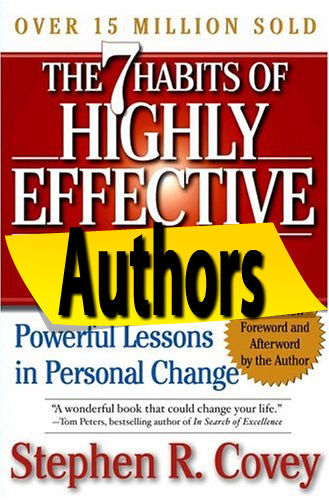
Stephen Covey is proving one of the habits of highly successful people is playing hardball; he’s struck a deal with Amazon to make them the exclusive providers of his eBooks, in exchange for at least 50% of the sales revenue. Amazon will also be promoting his books heavily. What does this mean for publishers, authors, and the concept of royalties in the digital age? We convened a Gear Diary chat session to hash it all out!
First, a bit of background here. Stephen Covey still has a print deal with Simon and Schuster, but since his contract does not cover eBook rights he has chosen to use RosettaBooks, a publisher more amenable to a higher author payout. The Author’s Guild is saying this is within the rights of any author whose contract does not expressly cover eBooks, but the publishers are fighting back.
Personally, I think it’s karma for trying to delay eBook sales by 4 months. Seth Godin, marketing guru, had a great blog post about this just last week. He too was criticizing the publishers for delaying book sales, and had a great proposal: make pricing flexible based on demand. It’s a great idea, and hopefully, someone will run with it. In the meantime, money talks, so if you see or hear about a vendor or publisher that’s really supporting authors and giving them their fair royalties, support them!
Being an opinionated bunch, some other folks on the team also weighed in:
Doug
OK, I had to add something. I just love this, from the New York Times Magazine interview with Jeff Bezos of Amazon.com:
Bezos: Basically you submit the book, you set the price for it, we charge the customer and then we give you 35 percent of the revenue.
Times: And Amazon keeps 65 percent? That sounds like a lot.
Bezos: Does it? You’re an author, what does your royalty check look like? Are your royalties 35 percent?
Ah yes, I see; because traditional hardcopy publishers screw over their authors—their content providers—that means it’s okay if Bezos does it so long as he doesn’t do it as badly. What a lovely approach!
If an author writes a book, creates the electronic copy, and does the work to push it out to the platform, why does Bezos think it’s reasonable to take 65% of the resultant income when all he does is provide the platform? He’s already providing most of that; adding in the ability of an author to self-publish and distribute on Amazon costs Amazon, probably, fractions of a cent per book. Maybe it’s just me, but this sounds like yet another case where authors are getting scammed.
Amy Zunk
It’s the reason A LOT of authors are now doing their own ebook publishing via Lulu or some other site. Or, they are just making an “old fashioned” PDF file and charging for it. I have purchased several this way. I think it all depends on the tenacity of the author and what he wants to do with his work. If he wants an ebook but doesn’t want to fight with his publisher, he can find a way to do it himself. And now see what Covey did by offering his ebooks exclusively to Amazon. It’s another avenue to explore.
Doug
An author acquaintance of mine, who is working very hard to get a reasonable amount of royalties from the publishing companies for eBooks, has this to say (quoted with permission):
“Publishers pay a VERY low royalty on ebooks, even though that makes no sense. There are no distribution costs! Very little design costs! Shit, they just upload our documents. But they are holding firm.”
Doug (yet again)
Another thing worth noting: the copyright model has to change. To take a couple of examples: Some enterprising nerd posted an electronic copy of Orwell’s 1984 on the Amazon self-publish site. A lot of people downloaded it. Amazon found out, and removed it from everyone’s Kindles (and iPhones and whatnot), and then made the “official” version available . . . for $10. Okay, I can swallow, reluctantly, paying a sawbuck for a new book in electronic format. But $10 for a 60-year-old book whose author has been dead for several decades? That’s just greed.
Mike
What amazes me is that folks take Apple to task for the 30% they charge – and you could fit a dozen ebooks in the space of one MP3 song!
Your Thoughts
What do you think? Does author exclusivity make a difference in your buying patterns? Share your thoughts below!

For another take on this issue, see Dave Cullen's (“Columbine”) excellent analysis at .
Definitely some complicated issues. I think it would be great if there was a shift in favor of the authors for ebooks and ink books. Good for Covey for getting a good deal. It will be interesting to see how others work out.